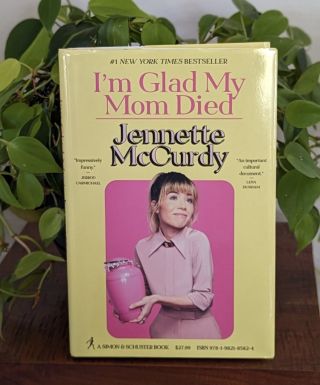
Duygu Balan
I’m Glad My Mom Died is an insightful portrait by former Nickelodeon child star Jennette McCurdy, revealing the truth of how childhood abuse and enmeshed parent-child boundaries can be mistaken for love.
The provocative title not only allows McCurdy the experience of being finally witnessed in her pain but also is a source of hope and inspiration for other abuse survivors and a declaration that healing is possible.
As a therapist who primarily works with familial trauma and attachment injuries, I have recommended this book to many clients and witnessed them feeling encouraged and inspired by the author’s healing journey.
In her, McCurdy often refers to feeling empty inside. Clinically, the realization that one’s parent is abusive, negligent, or unequipped causes so much anxiety and pain that numbing one’s feelings may become essential to survival.
Because abusive households are often run with the dictate What happens in the family stays in the family, traumatic experiences are sealed with silence. For this reason, many childhood abuse survivors adopt the false belief that they are the only ones who come from dysfunctional, negligent, or abusive homes.
Survivors often report feeling as if were they spoke up, no one would believe them, and they would be rejected or perceived as damaged. This leads to further silence, thus pushing survivors into abandonment. Isolation increases the risk of self-destructive coping mechanisms and heightens the tendency to repeat toxic relationship patterns. It also makes it less likely that survivors will ask for help from their loved ones, reach out to their communities, or seek clinical services.
One of the reasons why memoirs such as this one are so powerful and important is that they bring awareness to matters that so many endure in private. Prevention becomes possible by shedding light on domestic violence, parental abuse, and familial trauma. When these issues are left in the dark, it creates a toxic fertile ground where trauma is cultivated and passed on from generation to generation.
In our society, we are encouraged to love our parents, stay loyal to our families, and be grateful for the sacrifices they make for us. Estrangement from family members, enforcing clear, stringent boundaries, or cutting ties is frowned upon even if these relationships were negligent or abusive.
Most of McCurdy’s memoir focuses on her processing of complex feelings toward her mother, Debra, who pushed her to become an actor at the age of 6, passed down her disordered eating by teaching her how to restrict calories at age 11, and was emotionally, verbally, and sexually abusive.
Like many who grew up in abusive homes, McCurdy’s survival depended on her mother’s love and acceptance. Her mother vicariously lived through her and saw her daughter’s stardom as a means of deliverance from her life. She describes an enmeshed parent-child relationship in which her mother prevented McCurdy from emotional and bodily autonomy.
An enmeshed parent-child relationship occurs when a child is in tune with their parent’s emotional and physical needs to the point where they don’t learn to develop a sense of their own needs. The child has no emotional or physical independence, and their self-worth and identity form around meeting their parent’s needs. The child depends on the parent so much that even the thought of being without them creates intense anxiety and emotional dysregulation.
In her book, McCurdy writes about not only being responsible for her mother’s emotional well-being but also carrying the burden of her family’s financial stability. She describes that as a child, she hated acting but always felt like she would let her family down if she stopped. There is an anecdote in the book in which McCurdy tells her mother that she wants to quit acting, and her mother bursts into tears.
Boundaries Essential Reads
Reading McCurdy’s account of her relationship with her mother, it felt unclear where Debra ended and Jennette started. Growing up, McCurdy did not feel she had the right to say no to her mother and was not allowed bodily or emotional autonomy.
The book relates how McCurdy’s changing body caused her mother stress and agony. Growing up, McCurdy felt as though she was abandoning her mother. Her mom’s rejection of McCurdy’s development led to her daughter’s unhealthy relationship with her body.
Throughout the memoir, McCurdy describes being responsible for her mother’s happiness and constantly trying to be in tune with her needs. She states that she felt anxious and worried about her mother’s well-being from a young age: “The fragility of her life was the center of mine.”
In enmeshed relationships, parents tend to treat their children as peers and confide in them about adult matters that are not developmentally appropriate. McCurdy talks about how her mother would complain about her unhappy marriage and often speak ill of her father.
Poor boundaries and the inability of a parent to regulate and filter their emotions can lead to significant emotional abuse. McCurdy describes her mother as volatile and unpredictable, switching from being protective to attacking. This led to McCurdy resenting and being enraged by her mother, which caused her to feel intense guilt, resulting in more pain.
There is even an instance in the book when Debra tells her daughter that her cancer returned because of her. Even as an adult, such accusations are internalized by a child, leading to severe guilt and shame and making them more prone to manipulation, causing them to disregard their autonomy, needs, and desires.
The dichotomy of McCurdy’s account of her mother is fascinating. Throughout the memoir, McCurdy’s voice changes from heartbroken to resentful to outright angry, but between the lines, her compassion and admiration for her mom come through. Children often idolize their abusers because their survival depends on them. In one of her interviews, McCurdy says, “I don’t know who I am without her because I was living for her, and now she’s dead.”
McCurdy touches on her therapeutic journey and describes that when her first therapist referred to her mother as “abusive,” she had a severe reaction and dropped out of therapy. For McCurdy, accepting that her mother was abusive meant reframing her entire life and identity, which initially caused her turmoil and fear.
This is a common response to painful realizations during the therapeutic process. Since children depend on their parents for survival, when parents are abusive or neglectful, they have to develop narratives that normalize these behaviors. It’s common for survivors to adopt beliefs such as “I was a difficult child” or “My mother worked two jobs to support us. Of course, she had a short fuse.”
As awareness increases through therapy, the narratives essential to survival are shattered. This can cause intense pain, anxiety, and a feeling of being lost. Clients may reject these new perspectives, feel threatened by the reframes, become defensive, or drop out of therapy altogether.
For this reason, it is crucial to pace the therapeutic journey according to the client and respect the evolution of the person’s psyche. In some cases, therapeutic discoveries may be more than what the client can endure, which may mean that the client has reached their capacity for enlightenment for the time being. This may require slowing down the therapeutic process or pausing treatment until the client can explore further.
The fascinating thing about therapy is that we can never be unenlightened once we become enlightened. After struggling with disordered eating and alcohol abuse, awareness blossomed for McCurdy until ignoring her pain was no longer an option.
Because she never learned how to set boundaries as a child, she didn’t know how to implement them as an adult. Through therapy, she began to build herself, discovered her boundaries, understood her needs, and, by trial and error, learned how to set appropriate boundaries.
After years of intensive therapy, McCurdy realized there was no way she could fill the void left by her mother. Processing the pain of her childhood allowed her to explore her healing journey creatively and make sense of her trauma.
McCurdy’s memoir is a story of growth, healing, and triumph over tragedy. It is a manifesto of breaking the silence of parental abuse and attachment injuries. It has already led to decreasing stigma, raising awareness, and ultimately sharing uncomfortable truths that result in enlightenment and wholeness. As she says, “The more uncomfortable something was for me to put on the page, the more important it felt to put on the page.”
To find a therapist, visit the Psychology Today Therapy Directory.




















+ There are no comments
Add yours